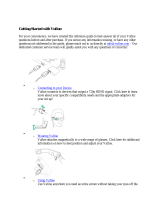
Table of contents - 3
TABLE OF CONTENTS
First things first 5
Your guides ............................................. 5
Basic care and tips for using your
computer.................................................. 5
Turning your computer off........................... 5
Taking care of your computer ..................... 6
Power cord information ............................... 6
Cleaning and servicing................................ 7
Connecting to the Internet 8
Connecting to a wireless network............ 8
Connecting to a wireless LAN..................... 8
Connecting with a cable ........................ 11
Built-in network feature ............................. 12
BIOS utility 14
Boot sequence....................................... 14
Setting passwords ................................. 14
Securing your computer 15
Using passwords ................................... 15
Entering passwords .................................. 15
Power management 17
Saving power......................................... 17
Ports and connectors 20
Information on USB 3.0............................. 21
Rear panel audio ports.............................. 21
Micro USB 22
Memory card reader 23
Connectivity options .............................. 23
Video and audio connectors 25
HDMI 26
HDMI Micro 27
Universal Serial Bus (USB) 28
Frequently asked questions 30
Requesting service ................................ 32
Tips and hints for using Windows 10 ..... 34
How do I get to Start? ............................... 34
How do I turn off my computer?................ 34
How do I unlock my computer?................. 34
How do I set the alarm? ............................ 36
Where are my apps?................................. 37
What is a Microsoft ID (account)?............. 37
How do I check for Windows updates?..... 38
Where can I get more information?........... 38
Troubleshooting ..................................... 39
Troubleshooting tips.................................. 39
Error messages......................................... 39
Internet and online security 41
First steps on the net ............................. 41
Protecting your computer.......................... 41
Choose an Internet Service Provider........ 41
Network connections................................. 43
Surf the Net!.............................................. 44
Security ..................................................... 45
Playing Blu-Ray or DVD movies 52






















